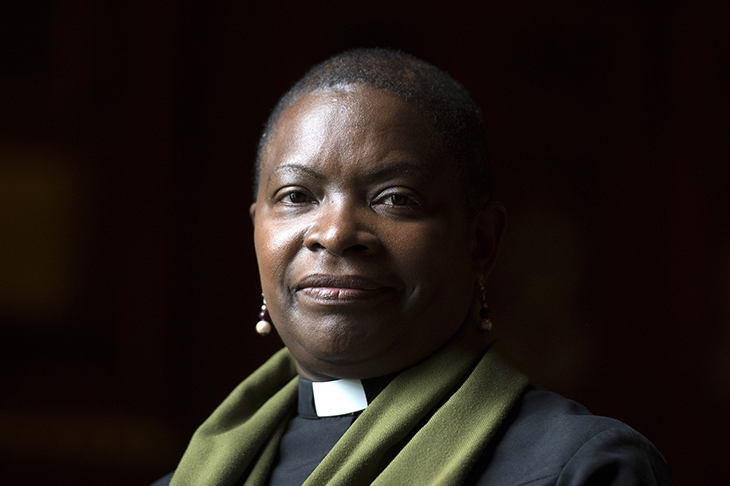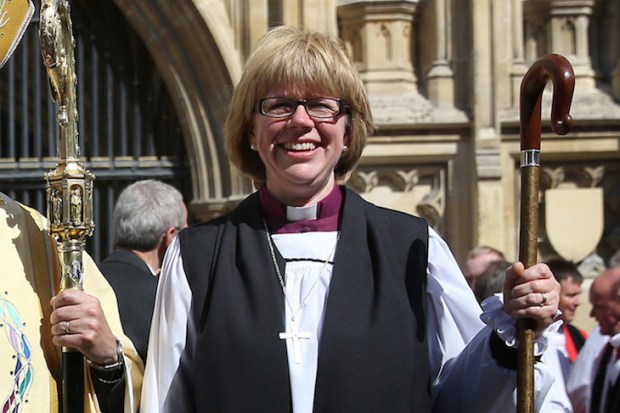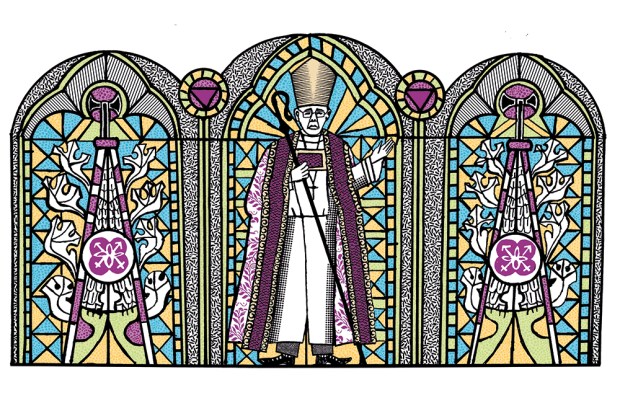East Kent is bracing itself. Its Church of England clergy are enjoying their last quiet months before Rose Hudson-Wilkin arrives as the new Bishop of Dover in the autumn, replacing Trevor Willmott. History is being made — the C of E is to have its first black woman bishop. But some members are clutching their heads in despair at what they see as Justin Welby’s predictably flashy appointment. Behind the scenes, there’s a lot of sighing going on.
Rose Hudson-Wilkin is the Chaplain to the Speaker of the House of Commons. Known for her dangly earrings, she is widely loved in the Palace of Westminster and is in her element as she strolls the corridors in her red clericals, purveying hugs and prayers at moments of political crisis.
So insistent was John Bercow on having her as his chaplain that he broke with the historic tradition of the job being done part-time by the Rector of St Margaret’s, Westminster. An old-school white Oxbridge male, Andrew Tremlett, had the St Margaret’s job, but Bercow was having none of him. He wanted Rose — and he got her.
They’re both stubborn modernisers: Bercow getting rid of ties and clerks’ wigs; Hudson-Wilkin adapting 16th-century daily prayers so they sound more global in tone, and leading women-centred prayers on International Women’s Day.
When Bercow was accused of bullying in the Houses of Parliament last year, Hudson-Wilkin stood up for him live on television. Loyal, kind colleague — or defender of a nasty man? Opinions differ. Bercow described Hudson-Wilkin last week as ‘one of the kindest and most loving people I have ever met… with an ability, more than she would ever know, to bring comfort in time of tragedy’. He was referring to her pastoral care of MPs after the Westminster Bridge attacks, which by all accounts was superb.
How will she fare, though, traipsing round the towns and villages of East Kent? What worries East Kent (population 89 per cent white British) is that she specialises in haranguing her audiences about not being diverse enough. She recently told a deanery synod audience in London that their white-British volunteer church officers should make way for ethnic minorities. ‘As if there were a queue of people wanting to do my unpaid job!’ said a friend of mine who’s the secretary of her church council.
Hudson-Wilkin told an audience in Liverpool that she now refuses to take the children from her parish into St Paul’s Cathedral for confirmation because while ‘the congregation is diverse’, the clergy, she says, is something ‘completely different’. She went into her local Specsavers and harangued the management for having no photographs of black people modelling the specs, and into M&S to complain about the lack of photos of black people wearing the bras. Last year, she was invited to be a guest speaker at a Rotary Club dinner in Dover. They didn’t much like being told off by her for their lack of diversity before she sped off back to London.
The morning after her appointment, she was interviewed by Nick Robinson on the Today programme. She quoted a horrible instance of racist abuse she’d received since the Brexit vote: a stranger shouting at her to ‘Go back to Africa’. She also said: ‘Rose has always done it the Rose way.’ ‘I’m Caribbean. I’m Jamaican, and I’m a child of God.’ Robinson then had to remind her she was also British.
There’s anxiety that she’s going to take out her lingering (but understandable) fury about colonialism and slavery on the unsuspecting Kentish population. ‘It is increasingly clear to me,’ she said in a recent talk, ‘that slavery has done lasting physical, psychological, emotional and social damage, not just to the individuals who were brutally removed from Africa, but to the very fabric of society.’ She wants to right this wrong.
The clergy are now worried that she is going to be bringing this agenda to the whole Canterbury diocese. The role of the Bishop of Dover, though officially a suffragan (i.e. assistant bishop) position, is more like a diocesan position, as the Archbishop is too busy travelling to have time to run his own diocese. So Hudson-Wilkin will be chairing the meetings, taking the confirmations, and presumably discussing diversity whenever the opportunity arises.
‘She’s welcome to the job,’ one clergyman said to me. ‘The Bishop of Dover must be one of the least attractive posts in the C of E — all the grind of being a diocesan bishop, only to be elbowed aside at any significant diocesan event, such as ordinations and Christmas, by a rather bigger mitre. I have never really understood why anyone would want to do it, unless out of an earnest desire to be a member of the House of Bishops at any cost.’
It can be difficult to disentangle honest scepticism from casual racism. Nervous clergy are watching their words carefully. ‘It’s a minefield,’ says one. Indeed it is. But I have heard from an absolutely non-racist clergyperson, who worked with Hudson-Wilkin 20 years ago, that ‘she was arrogant, opinionated, would tread on anyone to get her way, and had a chip on her shoulder’. That was then toned down with: ‘Maybe she’s changed. Lovely husband, by the way.’ (Rose is married to a Geordie, Ken Wilkin, who’s the prison chaplain at Holloway.)
Jayne Ozanne, campaigner for gay equality in the C of E, tells me, by contrast, that Rose is ‘very principled, pastoral and wise, and to my mind she should have been made a bishop years ago’.
Another cause for the surreptitious sighing, not just in Kent but among all onlookers, is that this appointment lays bare Justin Welby’s increasingly autocratic management style. The Archbishop of Canterbury, along with his appointments secretary Caroline Boddington, has been fast-tracking the appointment of as many women as possible to suffragan posts. Two weeks ago, Bishops Joanne, Sarah, Deborah and Dagmar were ordained suffragans in St Paul’s Cathedral in an all-woman batch, and very eye-catching and marvellous it all was.
Hudson-Wilkin is even more of a catch for Welby, and he’s clearly thrilled, as you could see when the two did their PR piece to camera at a church secondary school in Broadstairs on the day of the announcement. But, you wonder, has Welby really appointed Hudson-Wilkin because she is the perfect fit for East Kent, or has he done it more because she plays a role in his new PC vision designed to help the struggling C of E?
One must hope that Welby wouldn’t have chosen her unless he had total confidence in her ability to do the demanding and rather thankless job. But I’ve heard senior clergy express surprise at the appointment, as the role requires a great deal of senior management ability, of which Hudson-Wilkin hasn’t had much experience. ‘Having appointed a woman to be Bishop of London and a woman to Dover, perhaps he won’t now feel obliged to appoint a woman to York,’ one member said to me; John Sentamu retires in June next year. But who knows? Anything is possible — except, it seems, becoming a suffragan bishop these days if you’re a man. The C of E now runs new ‘identifying talent’ weekends, when clergy are invited on training courses and observed carefully by the management, to check if they tick the right boxes.
‘Just let’s be thankful that Rose Hudson–Wilkin’s not going to be the new Dean of Westminster,’ says a clergy member. It’s one of the few senior jobs not totally controlled by Welby and Boddington; indeed, Boddington was reported to be looking ‘thunderous’ the other day when she overheard a group of clergy extolling the virtues of the ex-Cambridge-don theologian David Hoyle who did get the Westminster post. (The Duke of Buccleuch was in charge of that process.) So it will be Hoyle, rather than Hudson-Wilkin, who will probably be conducting the Queen’s and Prince Philip’s funerals and explaining the tricky theology of Christian coronations live on air to sceptical questioners.
There’s lots to admire about Rose Hudson–Wilkin. She did over 16 years as a parish priest in Hackney, once spending 24 hours on the roof of her church because it was leaking and she wanted to draw attention to its plight. She says she fell in love with her husband when she heard his Geordie accent. She chose a boxful of earrings as her luxury item on Desert Island Discs. Let’s just hope she puts the job — the ordinary, mundane job — of being Bishop of Dover above any political agenda.
Got something to add? Join the discussion and comment below.
Get 10 issues for just $10
Subscribe to The Spectator Australia today for the next 10 magazine issues, plus full online access, for just $10.
You might disagree with half of it, but you’ll enjoy reading all of it. Try your first month for free, then just $2 a week for the remainder of your first year.














Comments
Don't miss out
Join the conversation with other Spectator Australia readers. Subscribe to leave a comment.
SUBSCRIBEAlready a subscriber? Log in